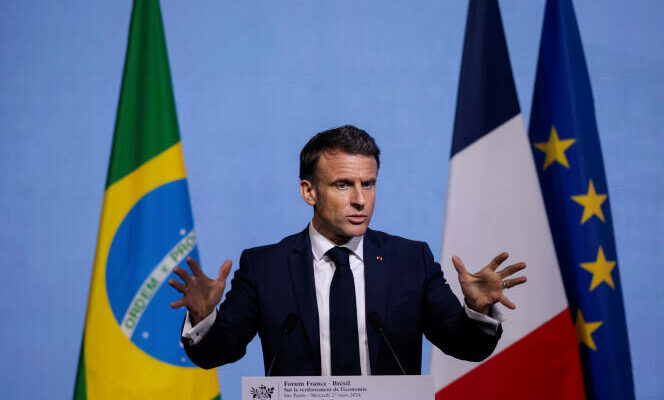Emmanuel Macron during the France-Brazil Economic Forum at the Federation of Industries of the State of Sao Paulo (FIESP) in Sao Paulo, Brazil, March 27, 2024 (AFP/Miguel Schincariol)
French President Emmanuel Macron insisted on Wednesday in Brazil that the trade agreement negotiated between the European Union and the South American Mercosur bloc was a “very bad agreement” and called for building “a new one”.
“I prefer to put my foot down”, the EU-Mercosur agreement “as it is negotiated today is a very bad agreement, for you and for us”, he said during a Economic Forum in Sao Paulo (south-east).
“In this agreement there is nothing that takes into account the subject of biodiversity and the climate. Nothing! This is why I say it is not good,” he asserted in front of an audience of Brazilian businessmen.
The French president called for the conclusion of another agreement which takes into account environmental issues for the EU as well as for Mercosur (Brazil, Argentina, Uruguay, Paraguay, Bolivia).
“Let’s put an end to Mercosur from 20 years ago! Let’s build a new agreement (…) which is responsible from a development, climate and biodiversity point of view”, he continued.
“A new generation agreement with mirror clauses which will facilitate access to the European market for your companies (…) and which will be more demanding on both sides with our farmers, our industrialists,” he said. said.
The French president has more than once stated his opposition to this trade agreement, the rules of which are not, in his eyes, “homogeneous” with European rules.

Emmanuel Macron during the France-Brazil Economic Forum at the Federation of Industries of the State of Sao Paulo (FIESP) in Sao Paulo, Brazil, March 27, 2024 (AFP/Miguel Schincariol)
The draft treaty, discussions of which began in 1999, intends to remove the majority of customs duties between the two zones by creating a space for more than 700 million consumers.
After a political agreement in 2019, opposition from several countries including France blocked its final adoption, an opposition which has strengthened with the agricultural crisis plaguing Europe. Other European countries such as Germany and Spain, on the other hand, are pleading for its conclusion and entry into force.
Mercosur heavyweight, Brazil tirelessly defends the adoption of the agreement with the EU.
© 2024 AFP
Did you like this article ? Share it with your friends using the buttons below.




